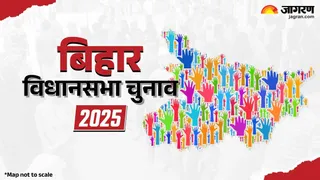By Vijay Kumar Rai Edited by: Dharmendra Singh Updated: Mon, 20 Oct 2025 03:13 (IST) Bihar’s politics has now gone digital, where leaders are reaching out to the public through social media. His activism has increased on platforms such as Facebook, Twitter and Instagram, through which he shares rallies and policies. Digital campaigns have become an effective way to attract young voters, although a lack of digital literacy remains a challenge. Online debates and controversies are also increasing. A symbolic picture is included with this news. Vijay Kumar Rai, Keoti (Darbhanga). As Bihar Assembly approaches, leaders are no longer confined to public meetings and posters, they have now also taken control of the digital battlefield of Facebook, Instagram and Twitter. The politics of liking, sharing and commenting has replaced the rally with the reel. Now viral clips and trending hashtags have more impact than speeches because in this election the pulse of the public runs on clicks. After the completion of the process of scrutiny of nomination papers submitted for the election assembly, people from the Keoti block headquarters to the rural areas are completely in the election colours. But this time’s election is completely different from before. Since independence, there has been a major change in the methods of election campaigning, the role of voters and the participation of workers. Apart from traditional methods, campaigning is now becoming completely technical and digital. In the past, elections meant celebration, with the sound of conch shells, bells and cans in the streets and the echo of enthusiastic slogans in support of the candidates. But now neither that enthusiasm nor that atmosphere is visible. Internet media, WhatsApp groups and phone calls have replaced knocking on people’s doors. Senior citizen Akhilesh Sah says, during the time of Jan Sangh, people themselves put up posters in their locality, hoisted the flag and campaigned by blowing conch shells. In today’s campaign, the common voter has all but disappeared. Now elections are no longer a celebration, just a formality. Remove ads just read news Now workers distributing leaflets are not seen: There was a time when workers from every party walked from place to place with leaflets in their hands. These pamphlets contained details of the candidate’s plans and manifesto. But now this scene has disappeared. Retired school principal Priyanath Chaudhary says that the party people used to prepare handwritten manifesto and delivered it to the dignitaries of the area. At each crossing there was debate as to whose vision was better. Now voters do not seek information themselves before elections, they only form opinions by seeing internet media posts. The enthusiasm to raise the flag on your own has disappeared. Earlier, voters themselves raised the flag of their favorite party at home. It was a symbol of pride and participation. But today, parties distribute flags for free, yet people refrain from hoisting them. Election enthusiasm has now gone digital, but intimacy is gone. Instead of door-to-door meetings, video messages and calls have now started. Candidates use Facebook Live, Twitter posts and Instagram roles to reach out to their supporters. Meetings and debates are limited to mobile screens. Local issues used to be discussed in small street meetings. Voters used to put questions directly to the candidate. Now this dialogue is over. Most of the campaigns are online and the conversation has become one sided. The effect of changes in election campaign was that now also the mutual commitment and brotherhood among the workers is decreasing. Earlier, workers from all parties sat on the same carpet and understood the voting process. Now everything has become technical, but intimacy is missing. Digital publicity increased, human contact decreased. The biggest medium of publicity now is internet media and digital platforms. From WhatsApp groups to Facebook ads, every party is trying to increase its reach. But in this race, human relationships have been left behind. Now there is no knock on the voter’s door, but the phone rings. This change is certainly modern, but it also weakens the grassroots spirit of democracy.
Bihar Politics: Leaders Entered Digital Battlefield, Politics Goes On Click – Leaders Campaigned Digitally In Bihar Assembly
